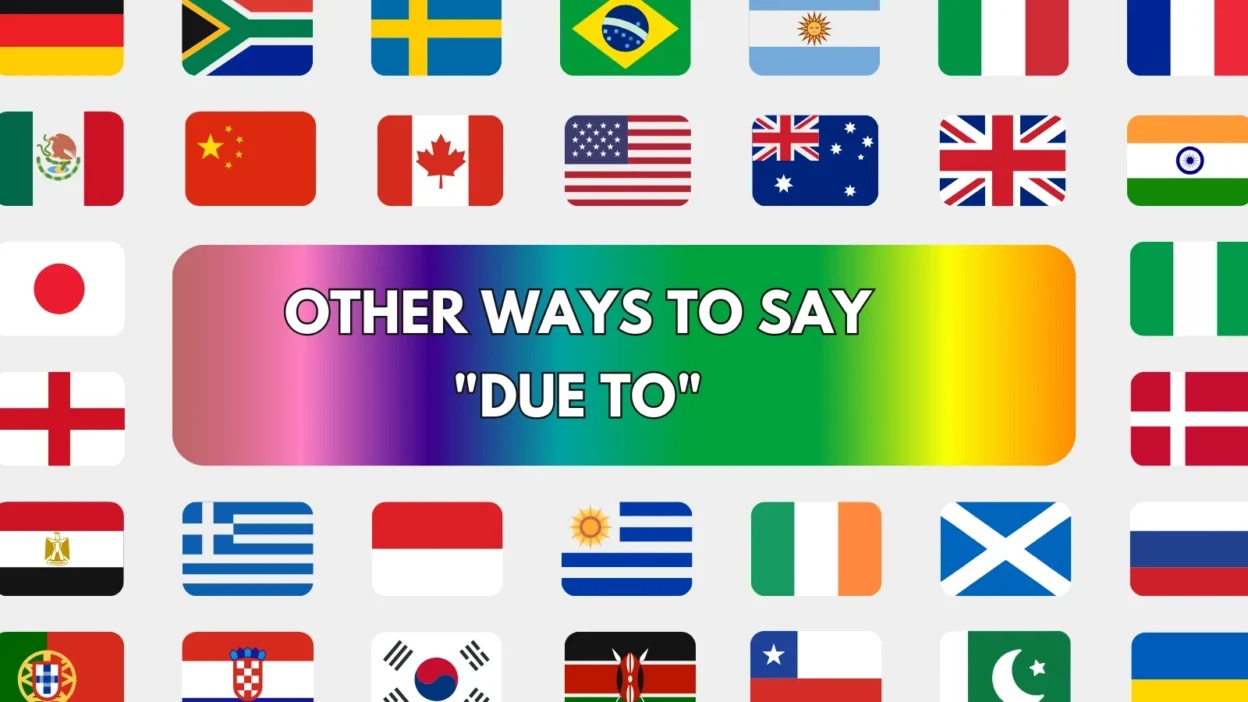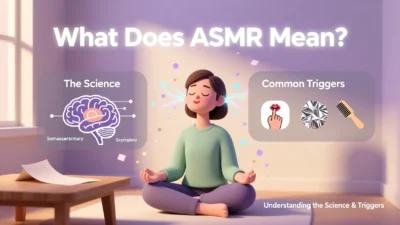The phrase “due to” is often used to explain the reason behind something. It’s a go-to choice in both writing and speech when showing cause and effect. However, overusing “due to” can make your writing sound repetitive or overly formal.
To help you diversify your language and communicate more clearly, here are 25 alternatives to “due to”. Each one includes a detailed explanation, example, best use case, and tone — so you’ll know exactly when and how to use them.
1. Because Of
Meaning:
Indicates the reason something happened or existed.
Detailed Explanation:
A direct and common alternative, “because of” is slightly less formal than “due to” and often used in everyday speech and writing.
Scenario Example:
The game was canceled because of the rain.
Best Use:
Casual conversation, general writing.
Tone:
Neutral, natural, everyday.
2. Owing To
Meaning:
Shows that something happened as a result of another factor.
Detailed Explanation:
“Owing to” is a formal synonym that fits well in written communication, especially in British English.
Scenario Example:
Owing to technical issues, the webinar was postponed.
Best Use:
Professional writing, formal emails, reports.
Tone:
Polite, formal, clear.
3. As a Result Of
Meaning:
Explains what event or condition caused another.
Detailed Explanation:
This phrase emphasizes the outcome that followed a particular cause.
Scenario Example:
As a result of the storm, many flights were delayed.
Best Use:
Academic writing, reports, analytical writing.
Tone:
Professional, explanatory.
4. Thanks To
Meaning:
Indicates a cause, often with a positive tone.
Detailed Explanation:
Used when the result is favorable or when you want to add a sense of gratitude.
Scenario Example:
Thanks to your help, we finished early.
Best Use:
Emails, acknowledgments, casual or polite settings.
Tone:
Grateful, positive, light.
5. As a Consequence Of
Meaning:
Points to something that happened because of a previous event.
Detailed Explanation:
More formal and often used in academic or analytical settings.
Scenario Example:
As a consequence of poor planning, the event failed to meet expectations.
Best Use:
Essays, research, professional documents.
Tone:
Formal, serious, academic.
6. On Account Of
Meaning:
Shows that something was caused by a specific factor.
Detailed Explanation:
A slightly older or more formal alternative, but still used in writing and formal speech.
Scenario Example:
The office closed early on account of the snowstorm.
Best Use:
Formal writing, literature, speeches.
Tone:
Polite, formal, classic.
7. As a Result
Meaning:
Indicates a direct cause-effect relationship.
Detailed Explanation:
This is often used at the start of a new sentence to transition into the outcome.
Scenario Example:
The budget was exceeded. As a result, the project was delayed.
Best Use:
Reports, analysis, transitions in writing.
Tone:
Neutral, professional, smooth.
8. As a Matter Of
Meaning:
Used when something happens because of a specific situation.
Detailed Explanation:
This is a slightly indirect and formal phrase, suitable for business or legal contexts.
Scenario Example:
As a matter of policy, refunds are not offered after 30 days.
Best Use:
Policy statements, corporate language.
Tone:
Formal, procedural, neutral.
9. Resulting From
Meaning:
Shows something occurred as a consequence of something else.
Detailed Explanation:
A smoother phrase often used within complex sentences for clarity.
Scenario Example:
Power outages resulting from the storm affected thousands.
Best Use:
Formal writing, reports, articles.
Tone:
Clear, objective, formal.
10. Caused By
Meaning:
Directly names what triggered the result.
Detailed Explanation:
A straightforward and clear alternative that emphasizes causality.
Scenario Example:
The crash was caused by a brake failure.
Best Use:
News writing, technical reports.
Tone:
Direct, factual, professional.
11. Triggered By
Meaning:
Indicates what started or provoked an event.
Detailed Explanation:
More dynamic than “caused by,” often used for events or reactions.
Scenario Example:
The protests were triggered by the new tax law.
Best Use:
News, social commentary, analysis.
Tone:
Strong, descriptive, impactful.
12. In Light Of
Meaning:
Because of or considering recent developments.
Detailed Explanation:
Useful when referencing new facts or events that influence decisions.
Scenario Example:
In light of recent events, we’ve updated our policies.
Best Use:
Professional updates, public statements.
Tone:
Considerate, formal, informative.
13. Following
Meaning:
Indicates something happened after a specific event.
Detailed Explanation:
Works well as a transitional phrase to show a timeline of cause and effect.
Scenario Example:
Following the audit, several changes were made.
Best Use:
Reports, newsletters, formal writing.
Tone:
Professional, smooth, structured.
14. In Response To
Meaning:
Describes an action taken as a result of something else.
Detailed Explanation:
Adds clarity by showing how one event directly led to a reaction.
Scenario Example:
In response to customer feedback, we redesigned the interface.
Best Use:
Customer service, updates, process descriptions.
Tone:
Professional, responsive, positive.
15. As a Direct Result Of
Meaning:
Strongly emphasizes a one-to-one cause and effect.
Detailed Explanation:
Adds intensity and clarity by removing ambiguity.
Scenario Example:
The app crashed as a direct result of a code error.
Best Use:
Technical writing, analytical documents.
Tone:
Precise, strong, clear.
16. Prompted By
Meaning:
Something was initiated because of another event.
Detailed Explanation:
More gentle and less definitive than “caused by,” but still effective.
Scenario Example:
The change was prompted by employee suggestions.
Best Use:
Change management, business reports.
Tone:
Polite, informative, neutral.
17. In View Of
Meaning:
Because of a particular fact or situation.
Detailed Explanation:
A formal and reflective alternative, good for cautious or considerate language.
Scenario Example:
In view of recent findings, we are delaying the launch.
Best Use:
Academic writing, official statements.
Tone:
Thoughtful, formal, careful.
18. Considering
Meaning:
Acknowledges a reason or factor influencing an outcome.
Detailed Explanation:
Less formal, used to show awareness of the situation.
Scenario Example:
Considering the circumstances, we did our best.
Best Use:
Conversations, informal writing, feedback.
Tone:
Casual, understanding, reflective.
19. Being That
Meaning:
Explains reasoning casually.
Detailed Explanation:
Very informal and conversational, often used in speech rather than writing.
Scenario Example:
Being that you were late, we started without you.
Best Use:
Dialogue, casual emails, informal writing.
Tone:
Casual, conversational, relaxed.
20. For the Reason That
Meaning:
Specifies why something happened.
Detailed Explanation:
A clear alternative, mostly used for structured or legal-style writing.
Scenario Example:
The request was denied for the reason that it lacked proper documentation.
Best Use:
Legal, official, academic writing.
Tone:
Formal, specific, explanatory.
21. Stemming From
Meaning:
Indicates an origin or source of a problem or situation.
Detailed Explanation:
Adds a thoughtful, analytical layer to describing causes.
Scenario Example:
The issue stems from a miscommunication during planning.
Best Use:
Analytical writing, evaluations, reports.
Tone:
Thoughtful, intellectual, clear.
22. Attributable To
Meaning:
The reason for something can be traced back to a particular cause.
Detailed Explanation:
Frequently used in data-driven contexts to maintain an objective tone.
Scenario Example:
The success is largely attributable to strong leadership.
Best Use:
Academic, financial, or scientific writing.
Tone:
Analytical, precise, objective.
23. Brought On By
Meaning:
Shows what event or factor introduced a problem or outcome.
Detailed Explanation:
Common in both medical and business contexts.
Scenario Example:
The symptoms were brought on by extreme stress.
Best Use:
Medical, psychological, business reports.
Tone:
Factual, descriptive, clear.
24. In Consequence Of
Meaning:
Formally shows the result of a cause.
Detailed Explanation:
Less commonly used, but effective in very formal documents or literature.
Scenario Example:
In consequence of his actions, he was suspended.
Best Use:
Legal, literary, formal writing.
Tone:
Traditional, formal, serious.
25. As a Function Of
Meaning:
Indicates dependency or direct relationship between variables.
Detailed Explanation:
Used in scientific or mathematical contexts to express causal connection.
Scenario Example:
The response time varies as a function of temperature.
Best Use:
Technical, scientific, or academic writing.
Tone:
Analytical, objective, precise.
Conclusion
While “due to” is widely used and accepted, varying your language with these 25 alternatives can greatly improve the clarity, tone, and professionalism of your communication. Whether you’re writing casually, formally, or technically, these phrases will help you express cause and effect more effectively.

Robat Hood is a creative writer and contributor at Saypadia, focused on explaining trending words, slang, and cultural phrases in a simple and engaging way. With a sharp eye for modern language trends, Robat aims to make Saypadia a trusted place for understanding how words are used online and in daily conversations. His content is informative, approachable, and designed for readers of all levels.




